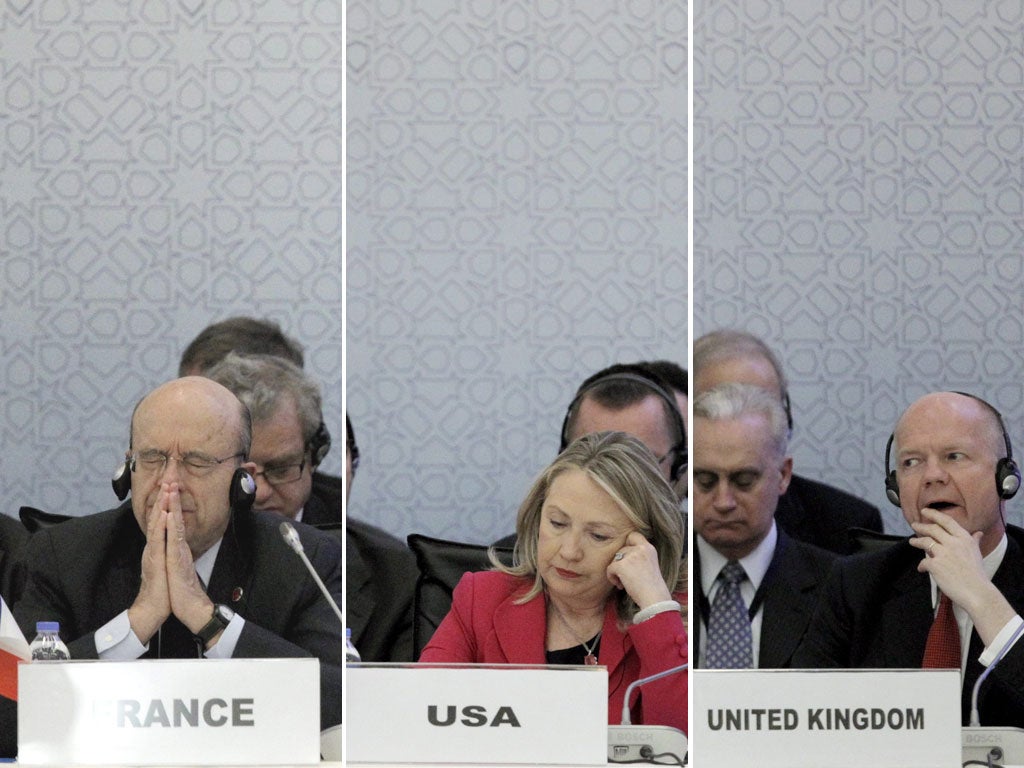World powers increase backing for an armed Syrian rebellion
Hillary Clinton talks of 'moment of truth' as Friends of Syria turn away from diplomatic solution

World powers including Britain and America yesterday pledged to boost funding and support for Syria's armed opposition, toughening their stance on a regime that has so far appeared immune to a barrage of sanctions, censure and diplomatic isolation.
While Western and Arab nations remained divided on the extent of support for the anti-regime fighters, a communiqué from a meeting in Istanbul of the so-called Friends of Syria grouping of 83 nations included an open call on soldiers to defy their orders. Gulf countries pledged a "pot of gold" to pay rebels' salaries, while Western countries appeared to shift their emphasis to action over flagging diplomacy.
Hillary Clinton, the US Secretary of State, conceded that Syria's President, Bashar al-Assad, was unlikely to heed the latest UN-Arab League peace plan that many had hoped could bring about a last-ditch negotiated end to a brutal crackdown that has tipped a nation to the brink of civil war.
"Nearly a week has gone by, and we have to conclude that the regime is adding to its long list of broken promises," Ms Clinton said. "The world must judge Mr Assad by what he does, not by what he says. And we cannot sit back and wait any longer." She added: "There is no more time for excuses or delays ... This is a moment of truth."
Underscoring the defiance of Mr Assad's regime, Syria's state media had declared victory over opposition groups on Saturday, after a year-long crackdown which the United Nations says has cost 9,000 innocent lives.
The Foreign Ministry spokesman, Jihad Makdessi, also rejected the UN envoy Kofi Annan's call for the Assad regime to halt the violence first. Mr Assad has said Syria is committed to Mr Annan's peace plan, although opposition activists say the regime is just buying time so it can continue its military onslaught.
And while Ms Clinton and other members of the Friends of Syria – a grouping which does not include China and Russia, the two world powers with the most sway over the regime – vowed to continue working to Mr Annan's blueprint, Arab nations are increasingly moving toward more pro-active support of the rebels. Saudi Arabia and other Gulf countries are creating a multimillion dollar fund to pay salaries to members of the armed opposition, who are out-gunned by Mr Assad's military. Members of the military who decide to swap sides will also be paid.
Saudi diplomats have also called for arms to be provided to the rebels, but Britain, America and Turkey have so far shied away from too much direct support for the armed resistance, fearful of fuelling a full-scale civil war. They have pushed punitive measures such as economic sanctions, but Ms Clinton yesterday did say the US would provide $12m in additional aid for the opposition which would be used to improve communications among anti-government activists.
Britain has already upped its financial support for communications and humanitarian assistance.
Direct military action of the kind that ousted Colonel Muammar Gaddafi in Libya has officially remained off the agenda, despite calls from the Syrian National Council for more concrete assistance and boots on the ground. "Don't prolong the catastrophe. The opposition is united; now it is time for you to support the Syrian opposition," said Burhan Ghalioun, the chairman of the SNC's executive council.
Soli Ozel, professor of international relations at Istanbul's Kadir Has University, said yesterday's moves marked more diplomatic manoeuvring, but was cautious about the effect on the ground.
"It is part of the process of putting pressure on the Assad regime. Whether or not the regime will be responsive is another matter," he said.
Subscribe to Independent Premium to bookmark this article
Want to bookmark your favourite articles and stories to read or reference later? Start your Independent Premium subscription today.

Join our commenting forum
Join thought-provoking conversations, follow other Independent readers and see their replies